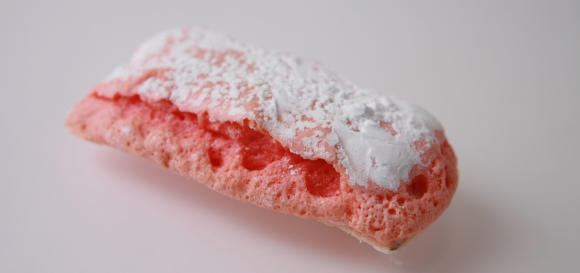
With 60 miles of champagne cellars underfoot, Epernay is rather single-minded in its devotion to sparkling wine. But unless you’re on a liquid diet you’re likely to find yourself in search for sustenance while visiting the town—sweet sustenance, such as chocolates and pastries from Vincent Dallet.
Vincent Dallet, a master pâtissier-chocolatier, is one of the top chocolate-makers in France and no slouch as a pastry-maker either. His shop/tea room is in the center of town and he has another in Reims.
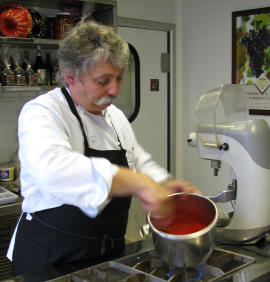
I first met Mr. Dallet, at his pastry and chocolate school, behind the Epernay shop, where individuals can join in occasional afternoon classes in French. I’d come to bake—or rather watch Mr. Dallet bake—his version of the region’s famous pink biscuit, the biscuit rose or biscuit rose de Reims, known in English as champagne biscuits.
Akin to the ladyfinger, the champagne biscuit is a light biscuit with a sprinkling of powdered sugar on top. It can be softened, if you like, by dipping it into champagne. Though often sold packaged as a dry and crumbly biscuit, Vincent Dallet prefers them tender and moist, as he explains in his personal recipe which he was kind enough to share below.
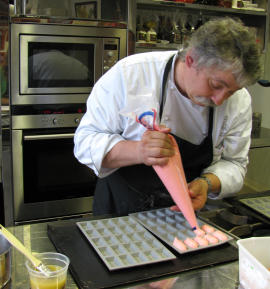
Mr. Dallet’s apprenticeship and training in pastry- and chocolate-making came during his years of journey as a compagnon du Tour de France, an organization through which young craftsmen and artisans, from woodworkers to chocolate-makers, travel around France to learn from masters in their field. After working with several 3-star Michelin chefs, Mr. Dallet opened his shop in Epernay in 1991, where he now continues the tradition by training young compagnons in his business. He opened a second shop in Reims in 2006. That same year he was named Best Pastry Maker in France by Pudlowski, a major French gastronomy guide.
Vincent Dallet in Epernay. 26 rue du Général Leclerc. Tel. 03 26 55 31 08. Open Tues.-Sun. 7:30am-7:45pm. Closed two weeks Jan./Feb. and two weeks July/Aug.
Vincent Dallet’s Ecole du Chocolate is just behind the shop. The current schedule of afternoon classes can be found here.
Vincent Dallet in Reims. 27 cours Jean-Baptiste Langlet. Tel. 03 26 35 40 53. Open Mon. 2-7:30pm and Tues.-Sat. 10am-7:30pm.
© 2012, Gary Lee Kraut
Here is Vincent Dallet’s recipe for biscuits roses, first in English (GLK’s translation) then in the original French.
Biscuits Roses, a.k.a. Champagne Biscuits, Vincent Dallet’s way
Ingredients:
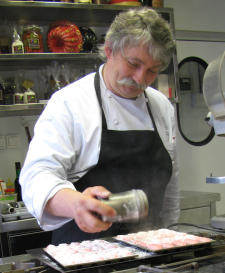
• 5 eggs
• 250 grams (1.1 cups) of powdered sugar
• 5 drops of red food coloring or carmine. [The scarlet coloring carmine that was originally used to color the biscuits pink came from cochineal insects, but other deep red food colorings will do.]
• 240 grams (1.9 cups) of flour
• 6 grams (.21 ounces or just under 1 packet) of yeast
Directions:
• Place a stainless steel mixing bowl on a saucepan of simmering water.
• Beat together the eggs and sugar and food coloring.
• Warm the mixture gradually until it becomes a thick mousse.
• Remove the mixing bowl from the bain-marie (boiler) and continue whipping until cool.
• Slowly pour the flour (previously sieved) along with the yeast and delicately mix it all together with a rubber spatula.
• Preheat the oven at 180°C (350°F).
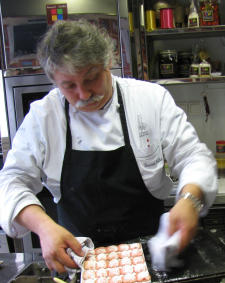
• Butter the biscuit mold.
• Fill it with the mixture to the top edge of the mold.
• Sprinkle with powdered sugar using a sifter.
• Bake for 25 to 30 minutes depending on the size of the molds.
• Remove from the mold while hot.
• Allow to cool. And enjoy without moderation.
Tip:
• For me a biscuit rose should be tender and moist, not dry. That’s the big difference with industrially produced biscuits roses.
• However, if you prefer them dry, you can simply leave them in the over for an extra 15 minutes at a temperature of 80°C (175°).
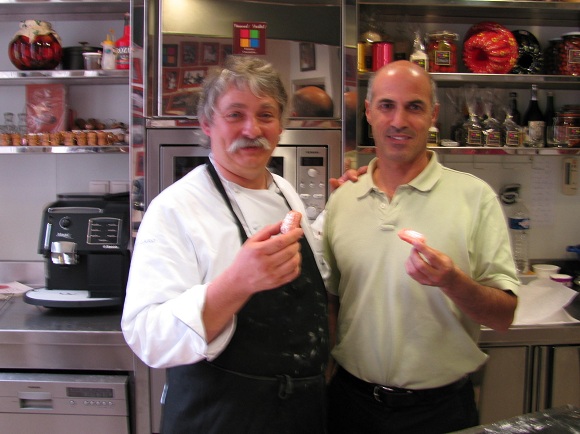
Biscuit rose à ma façon (Vincent Dallet)
Recette de base :
• 5 œufs entiers
• 250 g de sucre semoule
• 5 gouttes de carmin (colorant alimentaire rouge)
• 240 g de farine
• 6 gr de levure
Procédé de fabrication :
• Sur une casserole d’eau frémissante, posez un cul de poule en inox.
• Travaillez au fouet les œufs et le sucre et le carmin.
• Faites tiédir doucement ce mélange, afin d’obtenir une mousse épaisse.
• Retirez du bain marie, et fouettez jusqu’à complet refroidissement.
• Versez doucement la farine préalablement tamisée avec la levure et mélangez le tout délicatement à la Maryse.
• Préchauffez votre four à 180°.
• Beurrez les moules à biscuits roses.
• Garnissez les de pâte à biscuits rose à ras du moule.
• Saupoudrez les de sucre glace à l’aide d’une passoire étamine.
• Cuisez les entre 25 à 30 minutes suivant la grosseur de vos moules.
• Démoulez les à chaud.
• Laissez refroidir et dégustez sans modération….
Astuce :
• Pour moi un biscuit rose doit être fondant et moelleux et non sec.C’est la grande différence avec les biscuits roses fabriqués de façon industriel.
• Mais si vous les voulez sec, il suffit de les laisser 15 minutes de plus au four, mais à une température de 80°.


Thank you so much. I have looked extensively for this recipe in English as there is a lot to be desired when translating and much lost. I am truly grateful and appreciative for the recipe. I can’t wait to try this. I would like to let you know how it works out!!
Please do. And send us some if they turn out as well as Mr. Dallet’s.